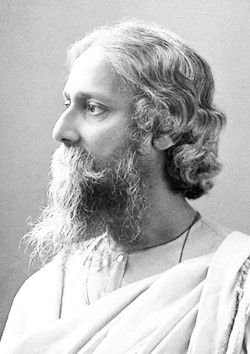 1-7 th August, 1941) [1] (25 boishakh, 1268 - 22 sravan, 1348 BS) [1] was a pioneer Bengali poet, novelist, music creator, playwright, painter, short story writer, essayist, actor, singer and philosopher. [3] Rabindranath was conferred with the title of Guru, Kaviguru and Vishva Bibhadra. [4] Rabindranath's 52 poems, [5] 38 plays, [6] 13 novels [7] and 36 Articles and other gadyasankalana person [8] was published in his lifetime or after his death. His total of 95 short stories [9] and 1915 songs [10] were included in the collection of fiction and songs respectively. The unpublished writings of Rabindranath published and published in the book, published in 32 volumes, have been published in Rabindra Rachanyabali. [11] All the letters of Rabindranath published in the 19th Century letters and four separate books. [12] He also painted two thousand photographs. [13] Rabindranath's writings translated into different languages of the world Has been there. In 1913, he won the Nobel Prize for Literature for English translation of Gitanjali. [14]
1-7 th August, 1941) [1] (25 boishakh, 1268 - 22 sravan, 1348 BS) [1] was a pioneer Bengali poet, novelist, music creator, playwright, painter, short story writer, essayist, actor, singer and philosopher. [3] Rabindranath was conferred with the title of Guru, Kaviguru and Vishva Bibhadra. [4] Rabindranath's 52 poems, [5] 38 plays, [6] 13 novels [7] and 36 Articles and other gadyasankalana person [8] was published in his lifetime or after his death. His total of 95 short stories [9] and 1915 songs [10] were included in the collection of fiction and songs respectively. The unpublished writings of Rabindranath published and published in the book, published in 32 volumes, have been published in Rabindra Rachanyabali. [11] All the letters of Rabindranath published in the 19th Century letters and four separate books. [12] He also painted two thousand photographs. [13] Rabindranath's writings translated into different languages of the world Has been there. In 1913, he won the Nobel Prize for Literature for English translation of Gitanjali. [14]
Rabindranath Tagore was born in a rich and cultured Brahma family of Calcutta in the Parali Brahmin family. [15] [16] [17] [18] He did not receive formal school education during his childhood; His teaching was arranged at home, leaving the tutor. [19] At the age of eight he started writing poetry. [0] [20] In 1874, his "Wishallas" poem was published in Tattvabhodhini Patrika. This was his first publication. [21] Rabindranath went to England for the first time at the age of seventeen in 1878. [22] In 1883 he married Mrinalini Devi. [22] From 1890, Rabindranath started living in the zamindari estate of Shilaidah in eastern Bengal. ] In 1901, he founded Brahmacharsharma in Santiniketan in West Bengal and started living there patiently. [23] [23] In 1905, he became involved in anti-partition movement. [23] In 1915, he was awarded the knighthood. [23] But in 1919 he left the title in protest of the murder of Jalianwala Bagh. [24] 1921 For the development of rural areas, he established an organization called Sriniketan. [25] In 1923 Vishwa Bharati was officially established. 6] He traveled extensively in a long time and spread the message of universal brotherhood throughout the world. [25] After a long illness in 1941, he died on the paternal home of Calcutta. [27]
[21] Rabindranath went to England for the first time at the age of seventeen in 1878. [22] In 1883 he married Mrinalini Devi. [22] From 1890, Rabindranath started living in the zamindari estate of Shilaidah in eastern Bengal. ] In 1901, he founded Brahmacharsharma in Santiniketan in West Bengal and started living there patiently. [23] [23] In 1905, he became involved in anti-partition movement. [23] In 1915, he was awarded the knighthood. [23] But in 1919 he left the title in protest of the murder of Jalianwala Bagh. [24] 1921 For the development of rural areas, he established an organization called Sriniketan. [25] In 1923 Vishwa Bharati was officially established. 6] He traveled extensively in a long time and spread the message of universal brotherhood throughout the world. [25] After a long illness in 1941, he died on the paternal home of Calcutta. [27]
Rabindranath's poetic literature is characteristic of the philosophical, greedy filmmaking, spiritualism, tradition, nature-loving, humanism, patriotism, philanthropy, romantic beauty, duality, language, rhythm and diversity, realism and progress. [28] Rabindranath's poetry is also poetic. [29] Indian classical and folklore His writings of culture and western science and arts [30] Through his fiction and essay, he expressed his views on society, politics and politics. [31] As a means of social welfare, he made a proposal for educating the.jpg) rural development and poor people of the village. [32] He also protested against social discrimination, untouchability, religious fanaticism and bigotry. [33] In the philosophy of Rabindranath, the human family has been specified as the origin of God; Instead of Rabindranath Devbisam, the worker said that man was worshiping God. [34] He considered music and dance as an essential part of education. [35] Rabindranath's song was one of his best works. [36] His son, My Sonar Bangla and Janmabhon-Captain Joy O GaanDuti, respectively National anthem of the People's Republic of Bangladesh and the Republic of India. [37]
rural development and poor people of the village. [32] He also protested against social discrimination, untouchability, religious fanaticism and bigotry. [33] In the philosophy of Rabindranath, the human family has been specified as the origin of God; Instead of Rabindranath Devbisam, the worker said that man was worshiping God. [34] He considered music and dance as an essential part of education. [35] Rabindranath's song was one of his best works. [36] His son, My Sonar Bangla and Janmabhon-Captain Joy O GaanDuti, respectively National anthem of the People's Republic of Bangladesh and the Republic of India. [37]